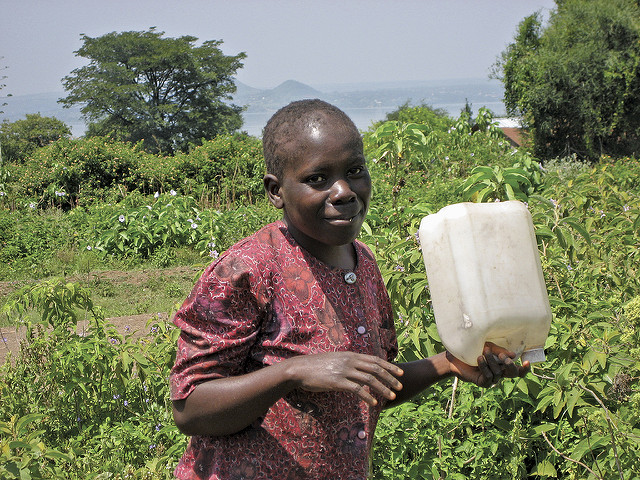A number of peer-reviewed studies show that charging for products that prevent disease (mosquito nets, deworming drugs, water treatments) results in low levels of usage, particularly among the very poor. But in some cases, those who receive such products for free may be less likely to use them, meaning that public subsidies may be wasted. This presents a policy conundrum: how can distribution programs target a health good to households that will use it? Such programs must screen out those uninterested in the product, but also not discourage potential willing users. In a paper recently published in Science, coauthors Pascaline Dupas, Michael Kremer, Alix Zwane and I show that requiring people to redeem vouchers to obtain a water treatment product achieves this dual goal.
We conducted a randomized controlled trial in western Kenya that compared three mechanisms for allocating dilute-chlorine water treatment solution: (1) charging a partially subsidized price; (2) direct provision free of charge; and (3) combining free provision with the effort of redeeming a monthly voucher at a local shop. By testing households’ stored water for residual chlorine, we assessed actual usage of the product, and thus compared the extent to which each mechanism generated errors of inclusion (providing the product to households that did not use it) or of exclusion (preventing households that would have used the product from obtaining it.)
The voucher mechanism screened out 88 percent of those that would have accepted the product for free but not treated their water. Meanwhile, the proportions of households whose stored water tested positive for chlorine were statistically indistinguishable between the group that received vouchers (32.9 percent) and the group that was given free chlorine solution directly (33.9 percent). This suggests that the inconvenience of keeping and redeeming vouchers deterred very few of those who would have used the water treatment solution if given it directly.
Vouchers also seem to target the poor, while richer households are more likely to obtain water treatment when they must pay for the product. Among the group charged approximately 10 cents for a month’s supply of water treatment solution, chlorine was detected in the stored water of only 12.4 percent of households, echoing the findings of previous studies that monetary costs screen out many potential users. Children from poorer households are generally at highest risk of diarrheal mortality and stunting, suggesting another advantage of free distribution through vouchers.
The inconvenience of voucher redemption is what economists call a “deadweight loss”—in contrast to a monetary price, through which the government or a private provider can cover some or all of its costs, no one “collects” the time spent by households; the value of this time and effort disappears. But our finding that voucher redemption had almost no impact on chorine usage suggests that the magnitude of this deadweight loss is small.
The next step in this line of research will be to test a voucher-based approach in other contexts and at scale, and to assess its long-term impacts on chlorine usage and child health. Vouchers could be distributed electronically through mobile phones, or integrated into community health worker programs.
Vivian Hoffmann is a Research Fellow in IFPRI’s Markets, Trade and Institutions Division.







